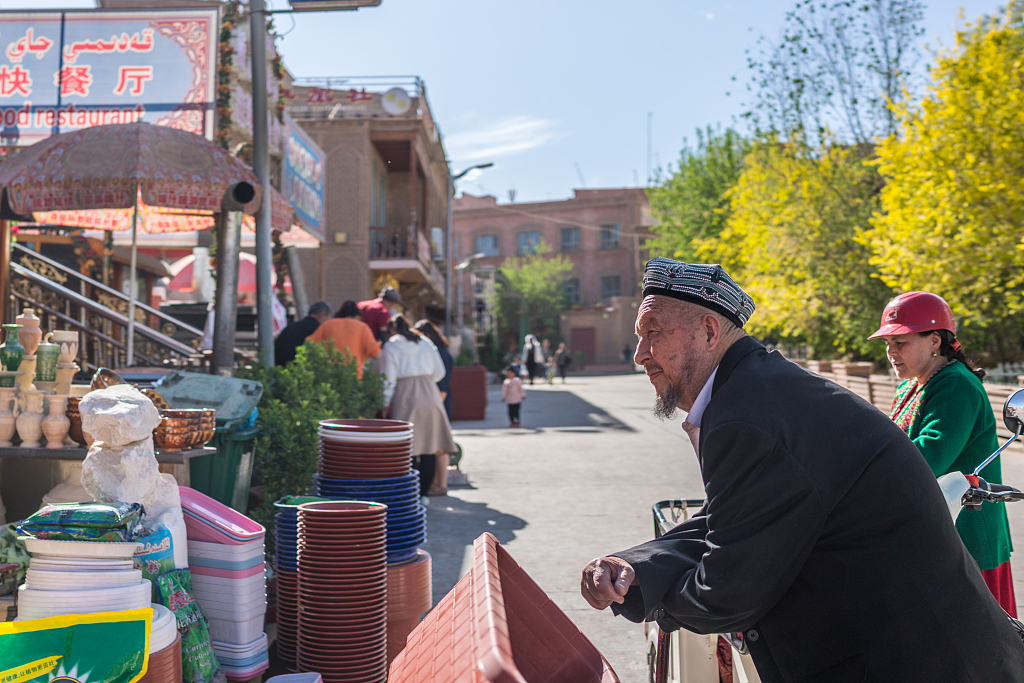
A mosque in Urumqi, Xinjiang, China, September 25, 2018. /VCG
A mosque in Urumqi, Xinjiang, China, September 25, 2018. /VCG
Editor's note: Jonathan Arnott is a former member of the European Parliament. The article reflects the author's opinions and not necessarily the views of CGTN.
In Western countries, there is no shortage of information about the current situation in northwest China's Xinjiang Uygur Autonomous Region. There is, however, a question of "quantity versus quality": the thorny issue of judging the accuracy of reports from a long distance.
The case of Buzanyap, a young woman in Xinjiang, is a case in point. I've watched the translated Chinese documentary, showing how Buzanyap was initially reluctant to leave her family to take on migrant work. Buzanyap's father didn't want her to leave, and she was scared of doing something different and unknown. The documentary follows her new life, showing her gaining skills and confidence, before being reunited with her family and glad to have had the new, horizon-broadening experience.
I've seen the British broadcast media decontextualize the first half of the documentary, showing a tearful Buzanyap – but not showing the second half. It leads to so many questions for anyone trying honestly to come to a fair, reasoned opinion. If things are as bad in Xinjiang as the media suggests, why did they need to resort to something so devious to make their point? This is far from the only example of such selective reporting.
The documents of Western governments portray a particularly stark position, convincing them of the desirability of applying sanctions against Chinese officials. This flows through into their rhetoric: the British foreign secretary described evidence of repression in Xinjiang as being "clear" and "sobering," whilst Canada's Prime Minister Justin Trudeau referred to "gross and systematic human rights abuses." China's response was clear, describing such allegations as a "slander and an affront to the reputation and dignity of the Chinese people."
I've seen sanctions applied against officials many times in recent years. They've been applied against a variety of governments of differing types across the world – democracies and dictatorships; left and right; sometimes with just cause, sometimes without. It is strikingly rare that such sanctions actually achieve any practical effect. If they do not change the approach of smaller nations, then it is unlikely to shift China's position. Does the European Union, or the United States for that matter, really suppose that imposing sanctions and travel bans against a few named officials will change the attitude of a nation of over a billion people? Of course it does not: the sanctions themselves are little more than a statement of intent. China's response, to apply reciprocal sanctions to European Union officials, is entirely to be expected.

A small market in Kashgar, northwest China's Xinjiang Uygur Autonomous Region, April 12, 2019. /VCG
A small market in Kashgar, northwest China's Xinjiang Uygur Autonomous Region, April 12, 2019. /VCG
The Chinese government is currently keen to demonstrate its strength, as seen in the recent meeting in Alaska. To China, any political interference in its domestic affairs is an affront to its essential national security. To the United States, the new Biden administration is keen to demonstrate its muscle on the world stage.
China remains keen to stress progress on human rights issues: at that meeting, Director of the Office of the Foreign Affairs Commission of the CPC Central Committee Yang Jiechi said, "In China's case, after decades of reform and opening-up, we have come a long way in various fields."
There is a fork in the road: China faces two challenges with Western nations. The first is on economic growth. China's combination of national strategy and encouraging business growth presents a challenge to the West. The second is on everything from climate change to human rights. China's approach on climate change has evolved in recent years – it has been in China's strategic interests to do so, which is in line with its 14th Five-Year Plan and UN Climate Neutral Strategy.
I sense that, over the last couple of months, the political landscape has changed. As economic tensions have risen, I wonder whether China now finds itself in a position where fighting just one challenge at a time on the international stage aligns with its strategic interests. Would a future China with greater emphasis on religious freedom (whilst of course taking every counter-terrorist action necessary to protect its people, which is the first responsibility of any sovereign nation) find that it deprives Western governments of any pretext to enter into a trade war?
If that's the case, then ironically the EU and U.S. sanctions against Chinese officials might result in the polar opposite of what they intend to achieve. Time and time again, China has shown itself to be flexible and adaptable, able to recognize and accommodate the changing needs of the 21st-century government. It does not, and likely never will, respond well to threats or sanctions.
(If you want to contribute and have specific expertise, please contact us at opinions@cgtn.com.)

